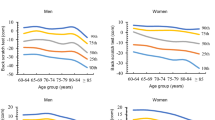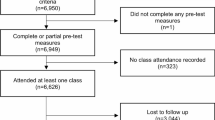Abstract
Functional fitness age (FFA), which we previously described, is a measure of functional age that reflects a person’s overall physical ability to complete daily tasks such as preparing meals and performing various household chores. The purpose of this study was to validate FFA in two elderly populations: 1) older subjects from different communities, and 2) older subjects participating in an exercise intervention program. FFA was calculated from 4 performance tests: performing arm curls; moving beans with chopsticks; demonstrating functional reach; and sitting and walking around two cones. The first study group was selected from 4 different communities (N=127), and was subdivided into a less active group (N=87) and an active group (N=40). The results of the 4 tests for the less active group were not significantly different from those for the original validation group used in developing the FFA equation. The FFA of the less active group (71.1±7.7 yrs) was not different from their chronological age (70.4±6.6 yrs). In the active group, except for the arm curls, test scores were significantly higher than those of the original validation group. The FFA of the active group (66.2±5.1 yrs) was significantly younger than their chronological age (70.9±4.2 yrs). Another group of 14 older women (79.5±3.9 yrs) was recruited for pre- and post-training testing. After the 3-month exercise program, they showed significant improvements in sitting and walking around two cones and functional reach; their FFA decreased significantly from 81.5±5.0 yrs to 78.3±4.5 yrs. The control group selected from the same community (N=16, 79.8±5.3 yrs) showed no significant changes in the 4 performance tests, and their FFA remained unchanged. These results indicate that our FFA is highly cross- validated for different Japanese communities, and is sensitive to changes associated with participation in an exercise intervention program.
Similar content being viewed by others
REFERENCES
Japanese Management and Coordination Agency: 2000 (URL: http://www.stat.go.jp).
Shigematsu R., Tanaka K.: Age scale for assessing functional fitness in older Japanese ambulatory women. Aging Clin. Exp. Res. 12: 256–263, 2000.
Borkan G.A., Norris A.H.: Assessment of biological age using a profile of physical parameters. J. Gerontol. 35: 177–184, 1980.
Dubina T.L., Mints A.Y., Zhuk E.V.: Biological age and its estimation. III. Introduction of a correction to the multiple regression model of biological age and assessment of biological age in cross-sectional and longitudinal studies. Exp. Gerontol. 19: 133–143, 1984.
Nakamura E., Moritani T., Kanetaka A.: Biological age versus physical fitness age in women. Eur. J. Appl. Physiol. 61: 202–208, 1990.
Tanaka K., Matsuura Y., Nakadomo F., Nakamura E.: Assessment of vital age of Japanese women by principal component analysis. Jpn. J. Phys. Educ. 35: 121–131, 1990.
Tanaka K., Shigematsu R., Nakagaichi M., Kim H., Takeshima N.: The relationship between functional fitness and coronary heart disease risk factors in older Japanese adults. J. Aging Phys. Activ. 7: 162–174, 2000.
Spirduso W.W.: Physical Dimensions of Aging. Human Kinetics, Champaign, 1995, pp. 33–55; 329-365.
Elward K., Larson E.B.: Benefits of exercise for older adults. Clin. Geriatr. Med. 8: 35–50, 1992.
Kim H.S., Tanaka K.: The assessment of functional age using “Activities of daily living” performance tests: A study of Korean women. J. Aging Phys. Activ. 3: 39–53, 1995.
Lord S.R., Lloyd D.G., Nirui M., Raymond J., Williams P., Steward R.A.: The effect of exercise on gait patterns in older women: A randomized controlled trial. J. Gerontol. 51A: M64–M70, 1996.
Shigematsu R., Kim H.K., Kim H.S., Tanaka K.: Reliability and objectivity of the test items to assess functional fitness required for performing activities of daily living in older adult Japanese women. Jpn. J. Physiol. Anthrop. 3: 13–18, 1998.
Bravo G., Gauthier P., Roy P.M., Tessier D., Gaulin P., Dubois M.F., Peloquin L.: The functional fitness assessment battery: Reliability and validity data for elderly women. J. Aging Phys. Activ. 2: 67–79, 1994.
Lockwood P.A., Yoder J.E., Deuster P.A.: Comparison and cross-validation of cycle ergometry estimates of VO2max. Med. Sci. Sports Exerc. 29: 1513–1520, 1997.
Rintala P., McCubbin J.A., Downs S.B., Fox S.D.: Cross validation of the 1-mile walking test for men with mental retardation. Med. Sci. Sports Exerc. 29: 133–137, 1997.
Deurenberg P., Kooy K., Leenen R., Weststrate J.A., Seidell J.C.: Sex and age specific prediction formulas for estimating body composition from bioelectrical impedance: a cross-validation study. Int. J. Obes. Relat. Metab. Disord. 15: 17–25, 1991.
Houtkooper L.B., Going S.B., Lohman T.G., Roche A.F., Van Loan M.: Bioelectrical impedance estimation of fat-free body mass in children and youth: a cross-validation study. J. Appl. Physiol. 72: 366–373, 1992.
Cress M.E., Buchner D.M., Questad K.A., Esselman P.C., de Lateur B.J., Schwartz R.S.: Exercise: Effects on physical functional performance in independent older adults. J. Gerontol. 54A: M242–M248, 1999.
Author information
Authors and Affiliations
Corresponding author
Rights and permissions
About this article
Cite this article
Shigematsu, R., Tanaka, K., Holland, G. et al. Validation of the functional fitness age (FFA) index in older Japanese women. Aging Clin Exp Res 13, 385–390 (2001). https://doi.org/10.1007/BF03351507
Received:
Accepted:
Published:
Issue Date:
DOI: https://doi.org/10.1007/BF03351507




